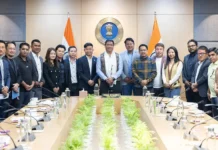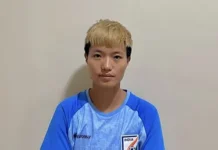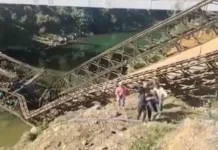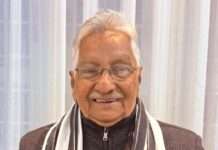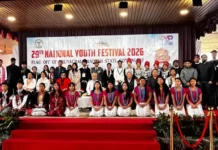ITANAGAR, 26 Nov: Chief Minister Pema Khandu on Saturday called upon the people of the state to perform their fundamental duties as enshrined in the Constitution, instead of stressing more on their fundamental rights.
Speaking at the Constitution Day celebration at the state assembly here, Khandu said that people never discuss their fundamental duties but always talk about their fundamental rights.
“The youths, who are the backbone of the society, should be educated on fundamental duties, which will contribute for development of the society,” the chief minister said, and assured the people that his government would remain committed to the democratic values enshrined in the Constitution.
“In fact, democratic values are core to our tribal culture and we will strengthen it through our commitment,” the chief minister added.
He said that everybody should work collectively under the ambit of the Constitution to realise Prime Minister Narendra Modi’s dream for a developed India.
“This should be the priority area for all, irrespective of political affiliation, caste, creed and religion, and should work collaboratively to achieve the goal,” Khandu said.
Stating that opposition plays an important role in a healthy democracy, the chief minister lauded the opposition in the state assembly for giving constructive suggestions to the government.
Khandu said that the Constitution of India is of a different genre, derived from best portions of constitutions of various countries and suitably adapted to Indian conditions. Under the chairmanship of Dr BR Ambedkar, the drafting committee took around three years to draft the Constitution and in this period, around 11 sessions were held, covering 165 days.
“We must remember that the Constitution was neither typeset nor printed; rather it was handwritten and calligraphic in both Hindi and English languages. We can just imagine the amount of hard work put in by Dr BR Ambedkar and his team of 17-member committee,” he said.
Khandu said that the democratic process in India started “since time immemorial, which was also prevalent among the tribal communities of the state, even before independence.”
Lamenting the lack of historical information of the past in the country’s education system, Khandu said that schools and college curriculum never taught the past history of the country and the Northeast to the students, which were lost in passage of time.
“Prime Minister Narendra Modi is trying his best to recollect the glorious history of the country through several initiatives under the aegis of the Azadi Ka Amrit Mahotsav, where unsung heroes of independence will be recognised and honoured. In Arunachal, the state government has already constituted a committee on unsung heroes to record their heroics, so that the future generations are inspired,” he said.
The chief minister expressed appreciation for Modi for attaching priority to the Northeast, saying that, since 2014, “special attentions were given to the region in terms of connectivity and infrastructure development.”
Legislative Assembly Speaker Pasang Dorjee Sona in his address informed that, to mark the occasion, the assembly celebrated a month-long programme from 26 October, in partnership with Rajiv Gandhi University, by organising various events, including mock parliament, debate, painting and essay competitions in various educational institutions.
“Arunachal Pradesh has one of the best performing and digitally sound assembly in the country,” Sona added.
Delhi University Political Science Professor Dr Himanshu Roy highlighted how the Constitution was framed and the democratic process started in India.
Earlier, Khandu unveiled an ‘Ashok Stambh’ and busts of Mahatma Gandhi and Dr BR Ambedkar in the assembly premises, and read the Preamble to the Constitution along with the participants. (PTI)

